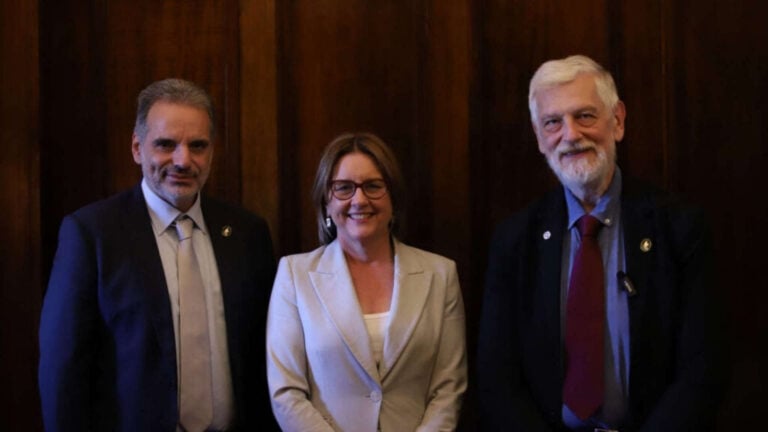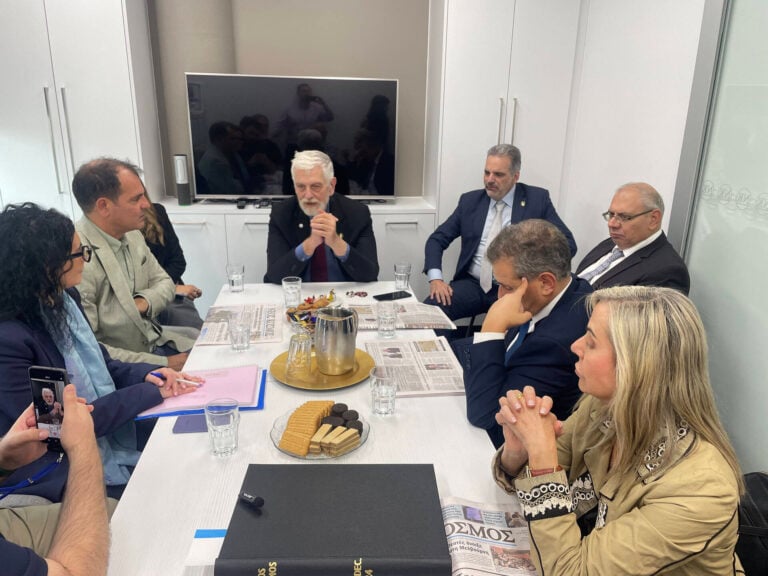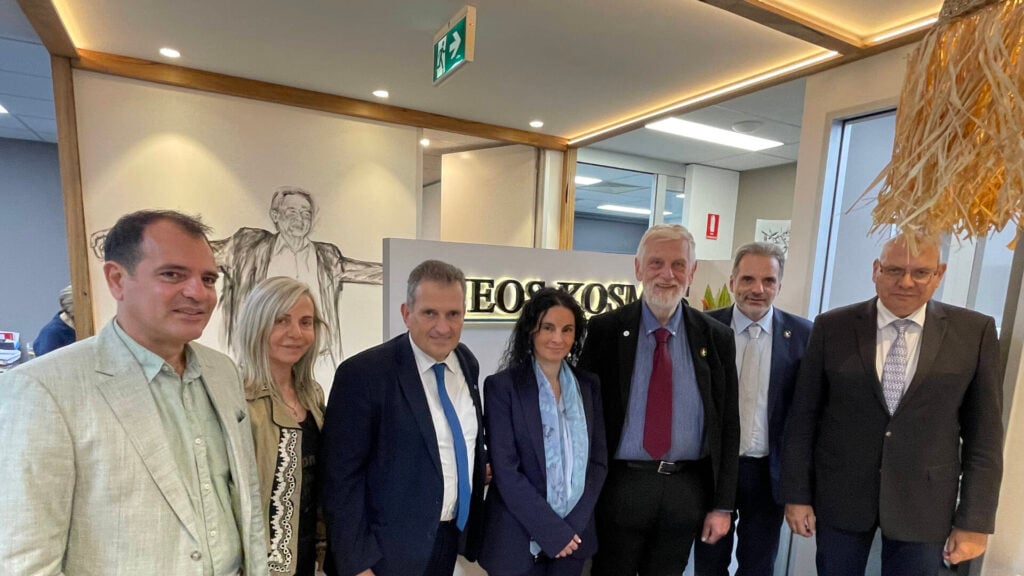On Thursday afternoon, Neos Kosmos publisher Christopher Gogos, editor Sotiris Hatzimanolis, and staff welcomed Deputy Minister for Foreign Affairs responsible for Greeks Abroad Ioannis Loverdos and his delegation to the newspaper’s Port Melbourne offices.
“Over the years, we have been honoured by visits from Australian prime ministers, state premiers, ministers, opposition leaders, and last just year the Ecumenical Patriarch Bartholomew,” said Gogos describing the occasion as a “historic visit.”
“But you are the first Greek minister in the history of our newspaper to visit our offices.”
He outlined Neos Kosmos‘s journey since 1957, noting it “soon became, and remains, the voice of the Greek diaspora,” with three weekly editions, two in Greek and one bilingual as well as a strong digital presence in Greek and English, the largest-circulation Greek-language newspaper in Australia and beyond.
“Our readers turn to us for issues that concern them, many of which are related to the Greek state. I’m sure you’ve already been briefed on the enormous problems we face with our consulates, Greek-language education, and other matters…”
In response, Loverdos, who was accompanied by Athanasios Balermpas, Dimitrios Karnavos, Katerina Ouli, Ambassador Stavros Venizelos, and Consul General Dimitra Georgantzoglou, thanked the Neos Kosmos team for the warm welcome and expressed regret that he was the first Greek minister to visit the newspapers headquarters.
He added that “others should have come before,” calling it an “error of the Greek state” to have stayed distant from the diaspora for so long. A journalist for 35 years himself, he praised the Greek Australian media for “holding the Thermopylae line.”
“Greece stands by you, appreciates you, and respects you,” Loverdos stressed.
Meetings in Melbourne and the aim of the tour
During his Melbourne visit, Loverdos said his tour of Australia and New Zealand aimed to “see the problems of the Greek diaspora on the ground and resolve them as best we can.” He explained he was accompanied by Athanasios Balermpas and Dimitrios Karnavos, Secretaries General of the Ministry of the Interior, and Katerina Ouli, Director General of Citizenship.
While in the city, the deputy minister met Victorian Premier Jacinta Allan. Also attending were Steve Dimopoulos (Minister for Environment, Tourism, Sport and Major Events), Kat Theophanous (Parliamentary Secretary for Women’s Health and Tenants’ Rights; MP for Northcote), Lee Tarlamis (Government Whip in the Legislative Council; South Eastern Metropolitan Region), and several members of the Victorian Parliamentary Friends of Greece.
According to the embassy of Greece in Australia, Loverdos “had the opportunity to be fully briefed on all issues concerning the Greek Australian community of Melbourne and Victoria, the largest outside Greece” and “spoke extensively about government initiatives designed to strengthen ties between Greece and its diaspora.”
A social-media post described the encounter as “a substantive meeting” where both sides expressed pride in the Greek community’s contribution to Victoria.

Photos: Embassy of Greece in Australia
Community, culture and consular priorities
The delegation visited the Hellenic Museum of Melbourne to tour “Rituals: Gifts for the Gods,” and met with radio station 3XY. Later, at the Greek Community of Melbourne headquarters, Loverdos conferred with President Bill Papastergiadis and the Board on improving consular services via digitisation and enabling all Greeks abroad to exercise their voting rights without restriction.
An information session on citizenship followed, along with a community reception. The minister full schedule continued with a visit to the Australian Hellenic Memorial and Shrine of Remembrance, Oakleigh Grammar, the Church of Saints Anargyroi, the Axion Esti Monastery, and the Greek Consulate for a press conference on Friday afternoon.
On Saturday, Loverdos departs for Hobart, then Adelaide and Perth, before returning to Greece. “I think we’ll find solutions to everything,” he added, drawing on the purpose of the tour.
“We are one nation”- language and Philhellenism
Speaking to Neos Kosmos, the deputy minister voiced particular concern about Greek-language education.
“With great sadness I see that not only in Australia, but everywhere there is Hellenism, the knowledge of the Greek language is declining, especially as generations pass. This concerns me greatly, and it also concerns the government. What can we do better to ensure that Greek language knowledge is not lost among the diaspora? It’s not easy, it’s called the mother tongue for a reason. If it’s not spoken at home by the mother, it’s difficult for a child to truly learn Greek.”
“For us, the language is of the utmost importance. The diaspora is not separate from Hellenism in Greece. There is one Hellenism, united, whether it resides in Greece or abroad. We are all one.”
He added that “Greece should not only care for Greeks, but also cultivate Philhellenism. We have gained much throughout history from Philhellenes, even the liberation of our homeland after 1821 was, to a large extent, thanks to them. That’s why we want to continue cultivating both the language and the culture, to teach the world, including here in Australia, what Greece truly is.
“Greece is not only antiquity, nor just its islands Mykonos and Santorini, which are important but not the whole story nor just gyros, Greek salad, and mousaka. It also has a modern culture that must equally be cultivated.”
On the shortage of Greek teachers abroad, Loverdos underlined that the living costs in many countries are high.
“If local communities offered accommodation or some support, more teachers could come, and I wonder why this isn’t happening, given how wealthy some communities are,” he explained.
He further revealed that the ministry is exploring AI-based digital platforms for Greek lessons, allowing students to access personalised learning “any time of day.”
Balermpas added that similar shortages occur in parts of Greece (e.g., high-rent on some islands), where municipalities often step in with housing and travel support.

Double taxation and Greek Australian pensioners
Asked which issues have emerged as priorities during his visit, Loverdos said the first was double taxation.
“It’s a real problem, raised by everyone ,even the Archbishop,” he said. “Mistakes were made in the past, including on our side, but now the responsibility lies mainly with the Australian side.”
He noted that talks were back on track following delays caused by Australia’s elections. “Hopefully, within the coming period we’ll have an answer and a final agreement. And I hope that if the prime minister’s planned visit to Australia in 2026 takes place, he will bring with him the long-awaited solution to this issue.”
The second key matter, he said, concerns health insurance for elderly Greek Australian retirees who wish to return home.
“The longing for home is strong and understandable, but many are afraid they’ll have no health coverage in Greece,” Loverdos said. While a reciprocity agreement with Australia would be difficult, he explained that Athens was exploring an internal solution.
“No Greek citizen will ever be denied care in a Greek hospital, but there are practical issues like which doctor to see and e-prescriptions,” he told Neos Kosmos.
He added that a new Greek law requires pensioners to contribute 8.5 per cent of their pension toward health insurance.
“We’re exploring how to extend this to retirees from other countries who wish to reside permanently in Greece,” he said.
“I understand that in Australia there isn’t a monthly pension like in Greece. People receive a superannuation lump sum and manage it themselves. So we’re seeking a way for Greek Australians to pay a small contribution, similar to Greek pensioners, in order to enjoy the same healthcare rights.”
Citizenship and civil registry in the era of digitisation and simplification
Praising Ambassador Stavros Venizelos and Consul General Dimitra Georgantzoglou as “outstanding professionals,” Loverdos acknowledged the chronic understaffing at Greece’s missions in Australia and outlined steps to recruit more staff and boost overseas allowances to make postings in high-cost countries more viable.
“The third issue,” he said, “concerns passports, actually two related matters. Many people say ‘I want a passport,’ but what they mean is Greek citizenship. There are many Greek Australians who identify as Greek but do not hold Greek citizenship. Others already have citizenship but want to obtain or renew their passports quickly, and that’s where the issue of understaffed consulates arises.”
A forthcoming joint ministerial decision will digitise the entire passport-issuance process, halving waiting times and enabling mobile consular teams to serve regional areas.
Loverdos said the Ministry of Foreign Affairs, which “also suffered deeply during the years of austerity,” is now “entering a stronger phase.”
Salaries and overseas allowances are being increased to attract more staff, while new recruitment drives will add diplomats and 140 administrative employees through ASEP.
“Higher remuneration, especially for countries much more expensive than Greece, combined with more staff, will make it more attractive for employees to serve in our embassy and consulates across Australia,” he said.
He confirmed that upon returning to Athens, he and Minister for Citizen Protection Michalis Chrysochoidis will sign the joint decision to make the entire passport process electronic. According to Director-General Chrysoula Aleiferi, the new platform, developed with the Hellenic Police, will halve issuance times.
Ambassadors and consuls will also gain authority to form mobile consular units to visit cities without permanent consulates.
“Residents in cities such as Hobart will no longer have to travel to Melbourne for essential paperwork; consular teams could visit every six months to process applications locally,” he explained.
Dimitrios Karnavos said it was unprecedented for such senior Interior officials to accompany a minister, “a signal of how seriously Athens views citizenship as a bridge to the homeland.”
He announced a fully digitised citizenship Information system within two years and a new citizenship code with simplified procedures.
Athanasios Balermpas flagged Greece’s declining birth rate and described broader access to citizenship for diaspora Greeks as “a way to grow Greece by making more Greeks.”
Upcoming reforms include a new Civil Registry Law to simplify name changes and online reporting of births, marriages and deaths, easing consular workloads. A new platform will allow citizens and lawyers to upload documents electronically and receive real-time feedback from Athens.
Katerina Ouli detailed legislative updates that streamline citizenship acquisition through the Civil Registry, calling it “a key digital reform making the process faster and automatic.”
She also noted flexibility when ancestry cannot be proven through direct records, allowing assessment of “other historical documents such as old Greek passports or certificates.”
Postal vote and participation: “We came here to unite”
Closing his remarks, Loverdos emphasised diaspora participation in Greek elections, rejecting claims of political motives.
“I am here as a representative of the Greek state, not of any party. On my lapel I don’t wear a party badge. I wear the national emblem.”
“When you participate in elections, you participate in Greek public life. Greece needs you and you need Greece.”
The deputy minister urged registration for postal voting, noting that in the last elections only around 50,000 of an estimated one million overseas Greeks voted while Balermpas added that in some consular districts “only 813 people registered to vote, and that’s how the Greek state perceives the size of the diaspora.”
“Even if you cast a blank vote, participation matters,” he said. “By voting, you declare your presence and the state must respect it.”
“Whatever party you vote for, your participation is what matters. We came here to unite, not to divide. To encourage, not to discourage. Participation strengthens democracy, strengthens Greece, strengthens you, and strengthens our community,” Loverdos concluded.
“We are one with you, Hellenism is everywhere.”







